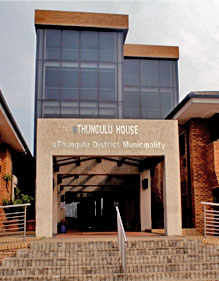|
Getting your Trinity Audio player ready...
|
 In part four of our local government series we take a look at the key pieces of legislation that are relevant to local government.
In part four of our local government series we take a look at the key pieces of legislation that are relevant to local government.
South Africa’s Constitution not only creates local government, but also sets out its objectives in various pieces of legislation. These regulate different areas of local government including the establishment and development of municipalities, administration and financial management in municipalities, and service delivery.
Legislation also empowers communities to get involved in the affairs of local government, and creates a responsibility on municipalities to foster this engagement. Communities are legally allowed to play an important role in the running of their municipalities, but too often they are not aware of their rights and responsibilities in this regard.
Starting with the Constitution, we will outline the various pieces of legislation that are relevant to local government.
The Constitution
The Constitution of South Africa is the supreme law in the land. Any law or conduct that is in conflict with the Constitution is invalid. All obligations that are imposed by the Constitution, including those on local government, must be fulfilled.
Chapter 7 of the Constitution deals with local government and sets out its overall objectives.
National Legislation
The Municipal Systems Act 32 of 2000
The Municipal Systems Act is part of a legislative series that aims to empower local government to fulfil its constitutional objectives. The Act sets out the core principles, mechanisms and processes that are necessary for municipalities to function. It defines the legal nature of a municipality and the manner in which municipal powers and functions are to be exercised in terms of:
- community participation, by providing for methods that councils must use to engage communities;
- performance management in municipalities;
- municipal services;
- municipal entities;
- public administration and human resources in municipalities; and
- credit control and debt collection in municipalities.
The Municipal Systems Act also states that municipalities must use an integrated development plan (IDP) as their principal strategic planning instrument.
An IDP is a municipality’s strategic plan to promote current and future economic and social development in the community. It sets out a five-year-plan for the municipality and is reviewed each year by the municipal council. The entire municipality and its citizens must be involved in the drawing up of an IDP.
All municipalities are obliged to produce an IDP. A municipality’s budget is based on the IDP, and other government departments that work in a municipality’s area should take the IDP into account when making plans and taking decisions.
An IDP has various functions. It ensures the effective use of scarce resources in a municipality by helping it to prioritise well, it helps to speed up delivery and to attract additional funds as investors are willing to invest when a municipality has clear goals, it strengthens democracy, and it promotes co-ordination between national, provincial and local government.
A municipal council must first adopt a document called a process plan that details the steps in planning, drafting, adopting and reviewing the IDP. This document ensures that when the planning takes place, all aspects are considered so that the process is cost-effective and benefits as many people as possible. Before a process plan is adopted, the community must be consulted and given notice of its content.
Local government legislation such as the Municipal Systems Act calls for communities to participate in the drafting of the IDP as well as its implementation and monitoring. Municipalities will have their IDPs available on their websites, and will hold public meetings which give citizens the opportunity to comment and contribute.
The Municipal Structures Act 117 of 1998
The Municipal Structures Act provides for:
- categories and the establishment of municipalities;
- the types of municipalities that can be established within the categories;
- the division of functions and powers between the categories of municipalities;
- municipal councils and office bearers in municipalities;
- internal structures; and
- the code of conduct.
The Municipal Finance Management Act 56 of 2003
The Municipal Finance Management Act (MFMA) applies to all municipalities and municipal entities. The MFMA provides for the management of the financial affairs within a municipality by describing the processes relating to municipal budgeting, spending and financial accountability.
The MFMA also provides for community participation in a municipality’s budget and finance management.
The Municipal Property Rates Act 27 of 2000
The Municipal Property Rates Act describes the processes that municipal councils must follow when setting their property rates and taxes. The Act regulates property rates and also sets out a uniform national framework for the levying of property rates by municipalities.
The Municipal Demarcation Act 27 of 1998
The Municipal Demarcation Act lays out the criteria and procedures for the determination of municipal boundaries in South Africa. The Act also creates and regulates the Municipal Demarcation Board, which determines municipal boundaries according to the Act, and renders advisory services in respect of relevant matters.
The Local Government Municipal Electoral Act 27 of 2000
This Act regulates municipal elections in terms of preparing for municipal elections. Duties covered include the establishment of timetables, nomination of candidates, location of voting stations, appointment of officers at voting stations, etc.
By-laws
By-laws are laws that are made by local government. Municipal by-laws are no different to any other law in the country – they can be enforced with penalties, challenged in court and must comply with other laws such as the Constitution. People who do not comply with by-laws can be charged with a criminal offence.
A by-law is passed if it has a favourable vote from the majority of the municipal council. Before passing a by-law, a municipal council must give the community an opportunity to review and comment on the by-law.
By-laws regulate the affairs and the services that a municipality provides in its area of jurisdiction. A municipality can pass a wide range of by-laws which involve:
- animals
- cemeteries and crematoria
- public parks
- waste management
- outdoor advertising
- graffiti
- informal and street trading
- community fire safety
- electricity supply
- waste management
- water supply
Access to information
Section 32 of the Constitution protects the right of South African citizens to access information. This section states that everyone has the right of access to any information held by the state, or held by any other person, that is to be used for the protection or exercise of any right. The Promotion of Access to Information Act of 2000 (PAIA) is the law that gives effect to this right.
Under PAIA, anybody can request information from both natural and juristic persons. Information can be requested from public and private bodies, and at the national, provincial, and municipal levels.
A person requesting information must make the request in writing by completing the prescribed form. When applying to a public body, the requester is not obliged to provide reasons for his request – but if making a request to a private body, the requester is obliged to provide reasons. If a person requesting information is denied the request or feels aggrieved by the decision, they are able to lodge an internal appeal, in the case of public bodies; to apply to court to intervene in the matter; or to lodge a complaint with the public protector.
PAIA also takes into account the possibility that certain information may not be released. In this case the information officer can separate or delete parts of the record in order for that information to be withheld. This is called ‘severability of the record’.
Now that you know which laws apply to local government, look out for part five of our series, which will show us how a municipality manages its finances.








